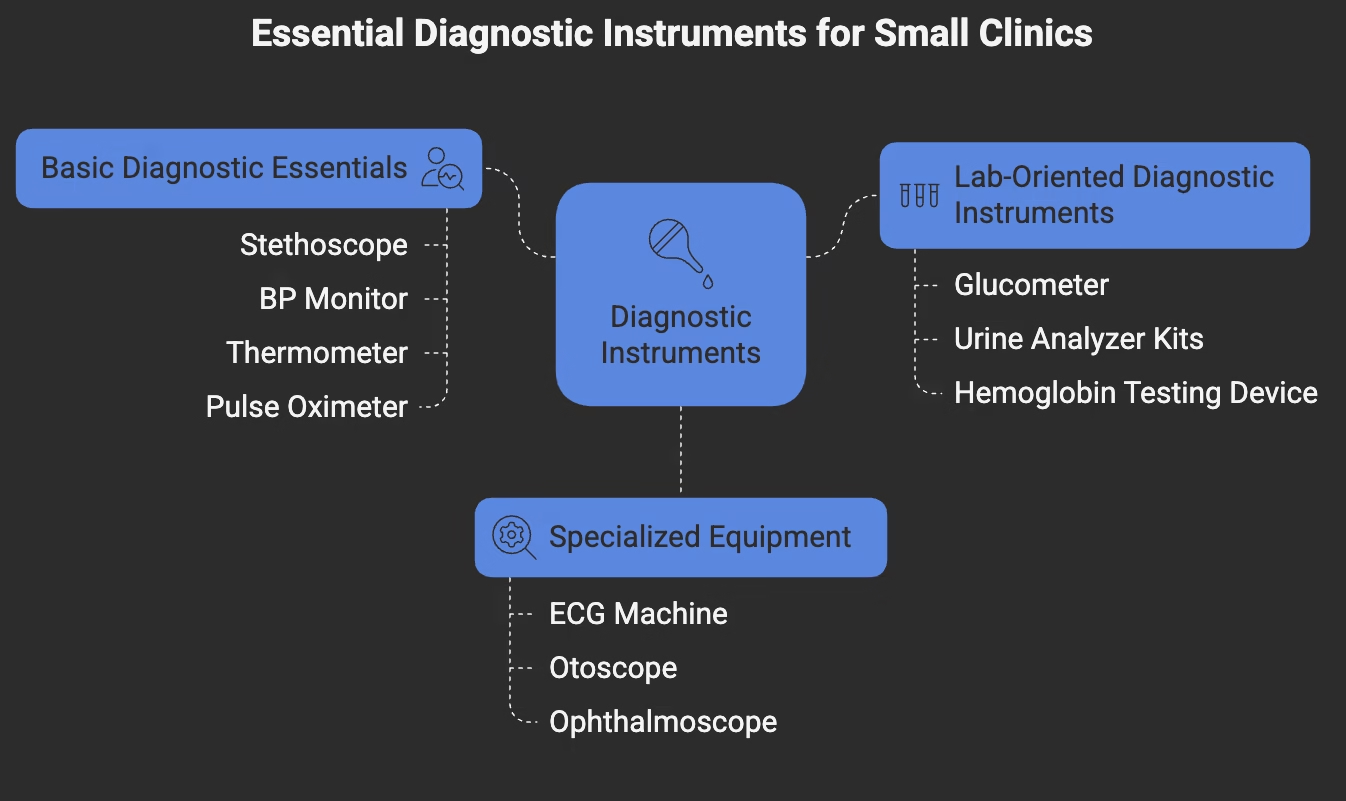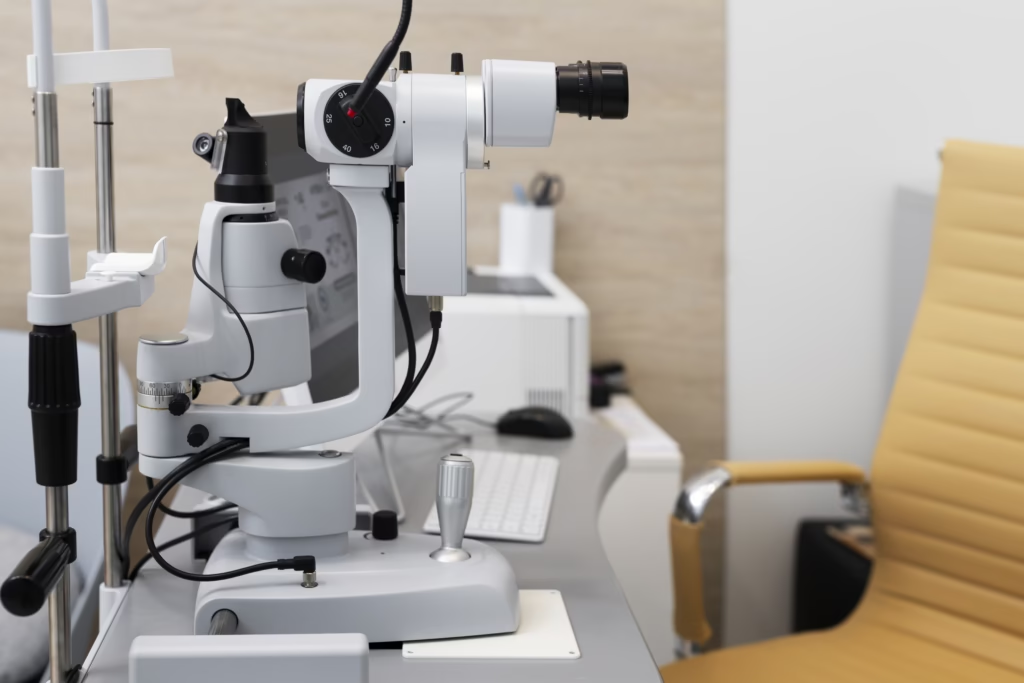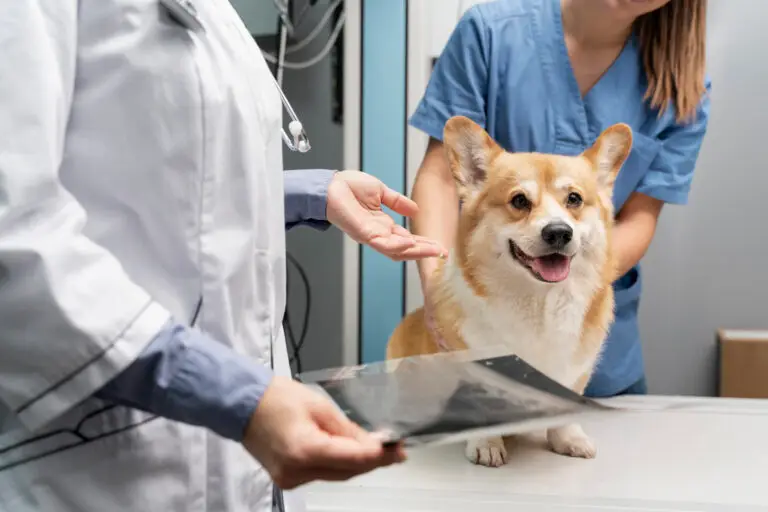Which Diagnostic Instruments Are Suitable for Small Clinics?
Table of Contents
Introduction
Starting a clinic, whether in a metro or a Tier 2/3 town, requires more than just space and staff.
For healthcare MSMEs, choosing the right diagnostic instruments can make or break daily operations.
Small clinics need affordable, reliable, and compact devices that allow them to handle common patient needs without overwhelming budgets.
This guide explores essential instruments, cost benchmarks, and sourcing strategies that will help small clinics make smart investment decisions.
What Are the Must-Have Diagnostic Instruments Every Small Clinic Should Stock Before Opening?
Every clinic must begin with a set of core instruments that cover the most frequent health checks:

- Basic Diagnostic Essentials
- Stethoscope: A must-have for general examinations.
- BP Monitor (Digital or Manual): Essential for hypertension screening.
- Thermometer (Infrared or Digital): Quick and reliable fever detection.
- Pulse Oximeter: Especially important after the pandemic, for oxygen saturation checks.
- Stethoscope: A must-have for general examinations.
- Lab-Oriented Diagnostic Instruments
- Glucometer: For quick diabetes screening.
- Urine Analyzer Kits: Low-cost option for small clinics.
- Hemoglobin Testing Device: Helps in diagnosing anemia, which is common in rural populations.
- Glucometer: For quick diabetes screening.
- Specialized Equipment for Consultation Rooms
- ECG Machine (Portable): Suitable for basic cardiac monitoring.
- Otoscope & Ophthalmoscope: For ENT and eye-related assessments.
- ECG Machine (Portable): Suitable for basic cardiac monitoring.
Why it matters: Patients expect small clinics to provide at least these essential services. Without them, clinics risk losing patients to better-equipped competitors.
Which Low-Cost Diagnostic Instruments Are Most Suitable for Small Clinics in Tier 2/3 Cities?
Small clinics in semi-urban and rural areas face budget and space constraints.
The focus should be on affordable, compact, and easy-to-use diagnostic instruments.
- Portable ECG Machines: Compact models under ₹20,000 can fit in small consultation rooms.
- Handheld Ultrasound Devices: Some portable scanners are available under ₹1.5 lakh, reducing dependency on large equipment.
- Tabletop Hematology Analyzers: Entry-level models allow quick CBC tests with minimal training.
- Digital BP Monitors: Reliable brands like Omron offer devices under ₹2,000.
- Glucometers: Cost less than ₹1,000, with strips as recurring expenses.
Case in Point: A general physician in Nashik equipped his clinic with portable ECG, glucometer, and urine analyzer kits for less than ₹50,000 and was able to attract 40% more walk-in patients due to in-house testing.
How Can Small Clinics Prioritize Between Advanced Diagnostic Machines and Basic Instruments?
Investment planning is crucial.
For small clinics and healthcare MSMEs, the choice between advanced machines and basics depends on patient demand and long-term strategy.
- Step 1: Cover the Basics First
- Stethoscope, BP monitor, thermometer, glucometer, ECG.
- These cover 70–80% of routine OPD cases.
- Stethoscope, BP monitor, thermometer, glucometer, ECG.
- Step 2: Analyze Patient Demographics
- Cardiac or diabetic-heavy population? Prioritize ECG and HbA1c machines.
- Maternal/child care focus? Ultrasound and hemoglobin testers become critical.
- Cardiac or diabetic-heavy population? Prioritize ECG and HbA1c machines.
- Step 3: Expand Gradually
- Start with lower-cost portable devices.
- Upgrade to advanced analyzers or imaging systems when the patient base and revenue stabilize.
- Start with lower-cost portable devices.
Pro Tip: Small clinics should avoid locking capital in advanced machines that remain under-utilized.
Instead, tie up with diagnostic labs for high-end tests until patient volume justifies purchase.
What Are the Average Prices of Essential Diagnostic Instruments for Small Clinics in India?
Budgeting correctly helps avoid financial strain. Here’s a reference list for small clinics:
- Stethoscope: ₹1,500 – ₹5,000
- Digital BP Monitor: ₹1,800 – ₹3,500
- Pulse Oximeter: ₹800 – ₹2,000
- Thermometer (Digital/Infrared): ₹500 – ₹2,500
- Glucometer: ₹700 – ₹1,200
- Portable ECG Machine: ₹15,000 – ₹40,000
- Otoscope/Ophthalmoscope Kit: ₹6,000 – ₹15,000
- Portable Ultrasound Scanner: ₹1.2 lakh – ₹2.5 lakh
- Basic Hematology Analyzer: ₹1.5 lakh – ₹3 lakh
Estimated Startup Budget: A general practice clinic can begin with ₹60,000–₹1 lakh for essentials, while specialty clinics may need ₹2–3 lakh.
Where Can Small Clinics Source Reliable Diagnostic Instruments at Wholesale Prices?
Sourcing plays a major role in both cost control and product reliability.
Trusted Channels:
- Medical Equipment Hubs in India:
- Delhi (Bhagirath Palace)
- Mumbai (Princess Street, Grant Road)
- Chennai (Parrys Corner)
- Delhi (Bhagirath Palace)
- Online B2B Marketplaces:
- IndiaMART, TradeIndia, and Medikabazaar offer wholesale rates.
- IndiaMART, TradeIndia, and Medikabazaar offer wholesale rates.
- Direct Manufacturers & Distributors:
- Ambala and Pune are known for diagnostic instrument manufacturing.
- Ambala and Pune are known for diagnostic instrument manufacturing.
- Government-Approved Suppliers:
- Vendors registered with GeM (Government e-Marketplace) ensure compliance and fair pricing.
- Vendors registered with GeM (Government e-Marketplace) ensure compliance and fair pricing.
Pro Tip for Clinics: Always ask for warranty, calibration support, and after-sales service before purchasing, as these directly affect long-term costs.
Conclusion
For small clinics and healthcare MSMEs, choosing the right diagnostic instruments is about striking a balance between affordability, functionality, and patient expectations.
Start with must-have devices like stethoscopes, BP monitors, glucometers, and ECG machines.
Add low-cost portable options for semi-urban clinics.
Plan advanced purchases gradually based on patient demand. Most importantly, source from reliable suppliers with strong service records.
Smart planning ensures clinics can serve more patients effectively without overspending on underutilized equipment.
Frequently Asked Questions (FAQ)
Q1: What are the first diagnostic instruments I should buy when opening a clinic?
A: Stethoscope, BP monitor, thermometer, glucometer, and ECG machine.
Q2: How much should I budget for diagnostic instruments in India?
A: Around ₹60,000–₹1 lakh for general practice essentials; specialty clinics may need ₹2–3 lakh.
Q3: Which instruments are best for Tier 2/3 small clinics?
A: Portable ECG, digital BP monitors, glucometers, and handheld ultrasound devices.
Q4: Where can I get wholesale prices on diagnostic instruments?
A: IndiaMART, Medikabazaar, and local hubs like Bhagirath Palace in Delhi.
Q5: Should I buy advanced diagnostic machines immediately?
A: No. Start with the basics and expand as patient demand grows.
- Basic Diagnostic Essentials
Also Read,
- The Ultimate Guide: Working Capital Loans for Small Business (MSMEs) in 2025
Understanding the Impact of Payment Terms on Working Capital for Clinics
How Poor Inventory Management Hurts Working Capital in Pharmacies.
Want a Better Business Credit Score? Small Pharmacies Can Now Use UPI & Cards to Build It
Want a Better Credit Score? Use Small Daily Payments to Build Your CBIL (For Clinics & Pharmacies)
Case Study:How a Small Clinic Improved Its Working Capital Management





